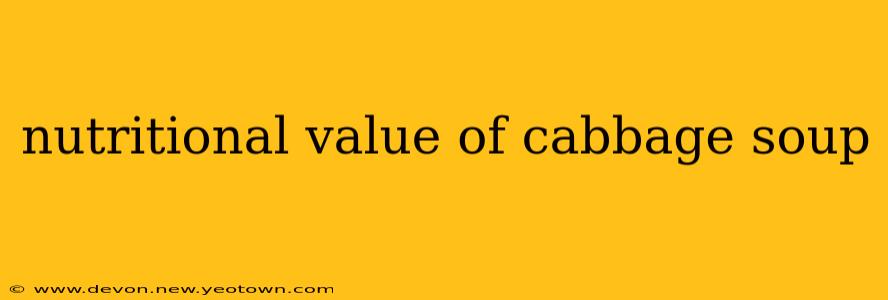For generations, cabbage soup has been a staple in kitchens worldwide, celebrated not only for its comforting warmth but also for its surprising nutritional punch. Often touted as a weight-loss aid, this unassuming dish is packed with vitamins, minerals, and antioxidants that contribute to overall health and well-being. But what exactly makes cabbage soup so nutritious? Let's delve into the delicious details.
What are the Nutritional Benefits of Cabbage Soup?
Cabbage soup's nutritional profile shines thanks to its diverse ingredients. The star, of course, is the cabbage itself. This cruciferous vegetable is rich in vitamin C, a powerful antioxidant that boosts the immune system and protects against cell damage. It's also a good source of vitamin K, essential for blood clotting and bone health. Beyond cabbage, the other vegetables often included—carrots, celery, onions, and tomatoes—add their own nutritional contributions, creating a synergistic blend of nutrients. Carrots offer beta-carotene, a precursor to vitamin A, crucial for vision and skin health. Celery contributes fiber, promoting digestive regularity. Onions boast antioxidants that combat inflammation, and tomatoes are brimming with lycopene, linked to a reduced risk of certain cancers.
Depending on the recipe, cabbage soup might also include beans or lentils, significantly boosting its protein content and adding fiber. Lean meats or poultry can be added for extra protein, although vegetarian or vegan variations are just as nutritious and flavorful.
Is Cabbage Soup Good for Weight Loss?
This is a frequently asked question, and the answer is nuanced. While cabbage soup is low in calories and high in fiber, it’s not a miracle weight-loss solution. Its fiber content promotes satiety, meaning you'll feel fuller for longer, potentially aiding in calorie control. The low-calorie nature of the soup also contributes to a reduced overall caloric intake, which, when combined with a balanced diet and exercise, can support weight management. However, relying solely on cabbage soup for weight loss is not sustainable or healthy. A balanced, diverse diet is always the best approach.
What Vitamins and Minerals are in Cabbage Soup?
The specific vitamin and mineral content of cabbage soup varies based on the recipe. However, we can highlight some key nutrients commonly found:
- Vitamin C: A powerful antioxidant, crucial for immune function.
- Vitamin K: Essential for blood clotting and bone health.
- Vitamin A (as beta-carotene): Supports vision and skin health.
- Potassium: Important for maintaining fluid balance and blood pressure.
- Fiber: Promotes digestive health and helps regulate blood sugar.
- Antioxidants: Help protect cells from damage caused by free radicals.
How Many Calories are in Cabbage Soup?
Calorie counts vary widely depending on the recipe and ingredients used. A basic vegetable cabbage soup can contain anywhere from 100 to 200 calories per serving, while variations with meat or beans will naturally have a higher caloric content. The key is to choose lean protein sources and avoid adding excessive fats or oils.
What are the potential drawbacks of cabbage soup diets?
While cabbage soup offers numerous health benefits, relying solely on it for extended periods can lead to nutritional deficiencies. The lack of variety may deprive the body of essential vitamins and minerals not found in abundance in cabbage and the other common ingredients. It’s crucial to remember that a balanced diet is always best for long-term health and well-being. Cabbage soup should be considered a part of a healthy diet, not the whole thing.
Can I eat cabbage soup every day?
Eating cabbage soup every day is not recommended for long-term health. While it offers several nutritional benefits, it lacks the diversity of nutrients found in a balanced diet. Consider it as part of a varied eating plan rather than a standalone meal plan.
In conclusion, cabbage soup is a delicious and nutritious dish that can contribute positively to a healthy diet. Its wealth of vitamins, minerals, and fiber makes it a valuable addition to your meal plan, but remember moderation and variety are key for optimal health. Enjoy the wholesome goodness of this humble soup, but always ensure it forms part of a balanced, well-rounded eating plan.

